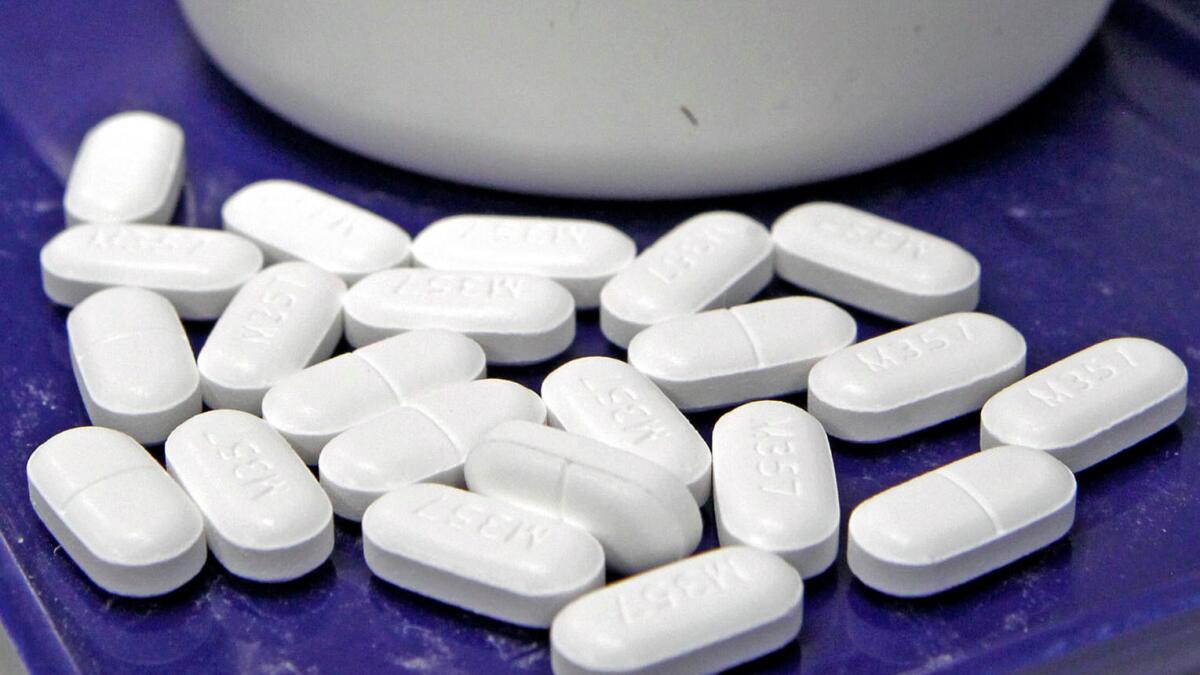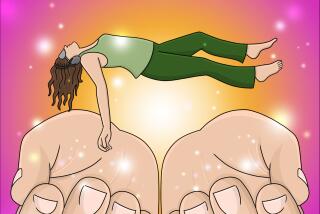Column: Kicking a dependence on prescription drugs can be very hard. Here’s how I’m doing it

There’s a difference between being addicted to a prescription drug and being dependent on it.
“I’m dependent on caffeine, but I’m not addicted,” said Keith Humphreys, a professor of psychiatry and behavioral sciences at Stanford University. “It’s not like I’d ever steal to get more coffee.”
The National Institute on Drug Abuse says addiction “is characterized by an inability to stop using a drug; failure to meet work, social or family obligations; and, sometimes (depending on the drug), tolerance and withdrawal.”
Physical dependence, meanwhile, “can happen with the chronic use of many drugs — including many prescription drugs, even if taken as instructed. Thus, physical dependence in and of itself does not constitute addiction, but it often accompanies addiction.”
It’s a fair point — and an important one to many in the recovery community, as has been made plain to me in recent days. Some readers were particularly unhappy with the online title of last Friday’s column: “Hi, I’m David. I’m a drug addict.”
In retrospect, a more nuanced headline would have been better, rather than an eye-catching (albeit imprecise) riff on a line from countless movies.
I also failed to anticipate how strongly some people would feel about distinguishing between addiction and dependence when discussing withdrawal symptoms.
And I’ll acknowledge that if what I’m going through is this difficult, I can’t even imagine what it’s like for someone trying to kick an addiction.
But a word of warning to those contemplating a change in their drug therapy: Withdrawal is withdrawal. It’s not easy.
“Call it what you want — addiction, dependence. What matters is that getting off the drug can be very difficult,” said Aaron Kheriaty, director of the medical ethics program at UC Irvine’s School of Medicine.
In my previous column, I noted that a number of prescription medications — painkillers, antidepressants, anti-anxiety drugs, tranquilizers, stimulants — can affect users’ bodies so intensely that severe withdrawal symptoms are likely if you stop taking them.
These symptoms can include fatigue, nausea, sweating, mood swings and even suicidal tendencies.
I was prescribed antidepressants about a decade ago to help cope with insomnia related to my 2007 diagnosis of Type 1 diabetes. And they worked well.
Eventually, though, I decided I wanted to come off the drug.
In no way am I encouraging other people to stop taking their drugs, and certainly not without consulting a doctor. If a drug therapy works for you, if it’s improved your quality of life, by all means stick with it.
If, on the other hand, you choose to make a change, be aware that there can be challenges ahead.
“Withdrawal symptoms are distressing and drive people to keep taking the medication in order to avoid the symptoms,” said Joanna Starrels, an associate professor at Albert Einstein College of Medicine.
She singled out commonly prescribed tranquilizers such as Xanax and Ativan, which act on the central nervous system and are known collectively as benzodiazepines.
“Stopping benzodiazepines like Xanax too quickly is not just distressing, it is dangerous,” Starrels said. “People can have seizures and even die from benzodiazepine withdrawal.”
I’m into my third week of abstinence after spending more than a year and a half gradually reducing my antidepressant doses. It hasn’t been easy. I’ve been cranky and irritable. I’m not sleeping well. I feel and hear a whooshing in my head, which I take as my pulse demanding its fix.
I decided to come off the drug after reading in the New York Times last year that antidepressants can be more habit-forming than many people realize, and can cause staggering, even debilitating discomfort when the body is denied its daily dose.
The article noted that “nearly half who tried to quit could not do so because of these symptoms.”
The wisest move, experts say, is to approach any move to come off prescription drugs by first consulting with a healthcare provider, someone who can prepare you for what’s ahead and assist when things become difficult.
“Even if it’s not severe, it can be extremely unpleasant,” said Gail Saltz, a clinical associate professor of psychiatry at New York Presbyterian Hospital. “You’ll do just about anything not to feel that way. Many people might just say, ‘Forget this. I’m going back on the medication.’”
Lon Schneider, a professor of psychiatry and behavioral sciences at USC’s Keck School of Medicine, said “patients need to be aware up front” about the journey they’re embarking upon, both in terms of beginning use of a prescription drug and understanding the dependence that can follow.
“Your best bet for coming off these drugs is what’s called a slow taper, a process that can last for months,” he said. “You want to do it slowly and methodically.”
That’s how I did it. Working with the endocrinologist who treats my diabetes, I gradually reduced the size of my daily dose. And once we brought that down, we switched my intake from every day to every other day, and then to every two days.
And then I took the plunge and stopped completely.
The experts I spoke with said the funky feeling I’m now experiencing — and I don’t mean that in a cool, Bootsy Collins sort of way — will fade, and I should be over the hump within a few more days. Thank God.
“Not everyone tapers at the same pace,” said Chad Brummett, director of the Division of Pain Research at the University of Michigan Medical School. “It’s a time-intensive process.”
That’s an important point. Everyone is different, and everyone’s reaction to a prescription drug will be unique.
Again, let me emphasize: Prescription drugs are not inherently bad. If they’re working for you, great. Don’t make any changes.
As I wrote on Friday: “A painkiller or an antidepressant can be the difference between a functional life and a life of unrelenting despair ... I’m not saying what’s right for anyone else.”
Nor am I now. But for anyone considering a new path, here are some lessons from my own experience:
- Be patient. Going onto prescription meds is easy. Getting off them is not.
- Get help. This is a medical issue. Make sure you’ve got a healthcare professional at your side.
- Set reasonable goals. Allow your tapering process to be as lengthy as necessary to feel comfortable and in control.
- Stay strong. And remember you’re not alone.
I found that being active helped distract from bad feelings such as grumpiness and moodiness. Going to the gym helped. So did dog walks. My dog and I have put in a lot of miles over the last few months.
Since the first column ran, a number of readers have recommended a variety of remedies to help cope with stress and sleep deprivation, from acupuncture and yoga to edible cannabis.
I plan to speak with my endo about this. I’m open to hearing other people’s experiences in this regard.
“If you are on a medication that can be difficult to withdraw from, like benzodiazepines or opioids, I would prepare for a potentially difficult path,” said Michael Barnett, an assistant professor of health policy and management at Harvard University. “It is OK to go very, very slowly.”
You’ll have plenty of time later to apologize to everyone for being such a crankypants.







